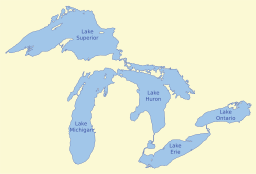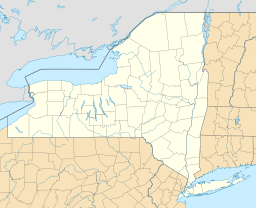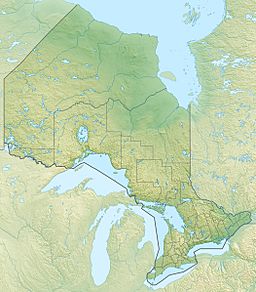Lake Admiralty facts for kids
Quick facts for kids Lake Admiralty |
|
|---|---|
| Location | North America |
| Group | Great Lakes |
| Coordinates | 43°34′55″N 77°19′12″W / 43.582°N 77.32°W |
| Lake type | former lake |
| Etymology | Admiralty |
| Primary inflows | Laurentide Ice Sheet |
| Primary outflows | Mohawk River to the Hudson River |
| Basin countries | Canada United States |
| First flooded | 12,000 years before present |
| Max. length | 241 mi (388 km) |
| Max. width | 57 mi (92 km) |
| Residence time | 7300 years in existence |
| Surface elevation | 178 ft (54 m) |
Admiralty Lake was a huge lake that existed a very long time ago. It was a proglacial lake, which means it formed from the melting ice of a giant glacier. This ancient lake filled the area where Lake Ontario is today.
Contents
What Was Lake Admiralty?
Lake Admiralty was a temporary lake that formed about 12,000 years ago. It existed in the basin, or natural bowl, that now holds Lake Ontario. This lake was created by the melting of the massive Laurentide Ice Sheet. This ice sheet was a huge glacier that covered much of North America.
How Lake Admiralty Was Different
The shoreline of Lake Admiralty was about 20 metres (66 ft) lower than Lake Ontario's current shoreline. This might seem strange, but it's because of how the land and ice changed over thousands of years.
The Story of Glacial Lakes
Before Lake Admiralty, there was an even older and larger lake called Glacial Lake Iroquois. Lake Iroquois had a much higher shoreline than Lake Ontario. This was because a part of the huge Laurentian Glacier blocked the valley of the St. Lawrence River. This blockage made the water level in Lake Iroquois much higher.
How the Lakes Drained
Lake Iroquois used to drain its water over the Niagara Escarpment. This is a long, steep cliff that runs across parts of North America. The water then flowed down the Mohawk River. From there, it continued into the Hudson River.
The Land Rises
As the giant glacier slowly melted and moved back, it became lighter. The weight of the ice had pushed the land down. When the ice retreated, the land slowly started to rise again. This process is called "rebounding."
The area around the Thousand Islands in the St. Lawrence River also rebounded. As this land rose, it changed how the water flowed. Eventually, the lake filled to its current level, becoming what we know today as Lake Ontario.
 | Lonnie Johnson |
 | Granville Woods |
 | Lewis Howard Latimer |
 | James West |




